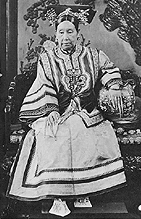
Empress Dowager Tsu Hsi. Digital image. Imperialism in China. USF’s Web Quest, n.d. Web. Apr. 2016.
Even after knowing all along that we were to do a 9-12 page research paper, I did not think about it until Dr. Stewart asked us to find an initial artifact. That was when my research really began. In the beginning, I thought about dong a close reading analysis on the novel, Blood Meridian. I started to read the novel but after realizing that I really didn’t like passage analysis, I decided to keep searching.
One topic that I was interested in was Asian history, more importantly Chinese history. It always bothered me that even though I was born in China, I knew more English and had more knowledge about American history than Chinese history. It also helped that Professor Hart lectured about the Nanking Massacre which interested me more. I wanted my research to focus on China’s history. After I settled on the general topic, I had to narrow down the time period. A fascination I had was on China’s imperialistic times but that was a hard time zone to find an artifact with primary and secondary sources to back up my paper.
I remember my great aunt telling me stories of when my great uncle was in the Chinese Army under Mao Ze Dong’s reign. She told me how great of a leader he was and how smart he was. I believed everything she said until I found out he was the head of the Communist party. In fact, he is considered the founding father of the Community party. From what I knew, communism was a bad form of leadership. So why then did my great aunt praise him so much?
That is the fundamental question I started with: How did Mao Ze Dong’s leadership style affect his influence in China? This question still gives me plenty of room to narrow down and answer an even more specific question. I set out to the library and started searching away for any books related to Chairman Mao. To my benefit, the library had a vast collection of Mao memorabilia. I found some of Mao’s speeches which also contained his infamous Little Red Book. I decided to use that as my artifact for this paper.
The book was a collection of many of Chairman Mao’s sayings which was given to practically every citizen in China. It was written during the time of China’s Revolutionary War, also called China’s Civil War, in December of 1936. I chose to write and research about his book because after the disbursement of this book, his popularity skyrocketed and spread from upper class to middle class even to lower class. This phenomena is unusual because not many leaders receive support from every class structure.
Mao was also very clever when it came to war strategies, which his Little Red Book also covers. In fall quarter of seminar, we read “The Art of War” by Sun Tzu which I really enjoyed along with the Machiavelli piece. They were different in a sense because they taught about war tactics, not the physicality of war. I think the mental side of war is just as important as the physical part of war if not more important because strategizing is a crucial part of war. No country goes into war without a plan.
I plan to structure my paper by introducing Chairman Mao’s book which will include his success with all 3 social classes. Then I will go back in time to the period when China’s last imperial dynasty was in turmoil, that leads to Mao rising to power. I will then talk about the reasons on why Mao distributed this book, allowing all citizens to be able to read a recite his words. I will follow up by relating that information with why he became so popular and how he maintained power for so long.
During our last quarter in HumCore, we were required to read World War Z. Upon reading World War Z, Chairman Mao has come up a couple times when the narrator talked about how China was changing. Part of the reason on why the zombie apocalypse started was due to the rapid industrialization of China. That got me wondering if the accelerated industrialization had a negative impact on China. If so, why then did Chairman Mao still push for an industrialized China? Though I referenced World War Z here, I will not be using it for my research paper because it is a fictional novel. World War Z just added to my fascination on Mao.
Even though Chairman Mao really encouraged education and knowledge, he banned certain books and movies from the public. He also plastered his face everywhere possible. There is also controversy with the ethics of his wives. These points will contribute to my thesis which I am still working on. My secondary sources will consist of different books during China’s Revolutionary War.

